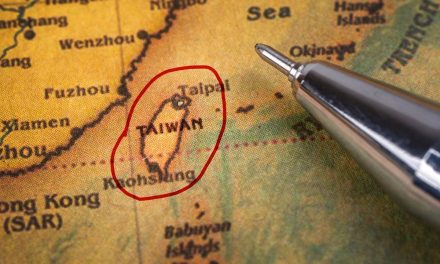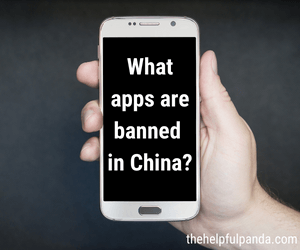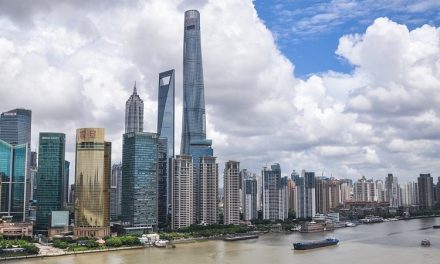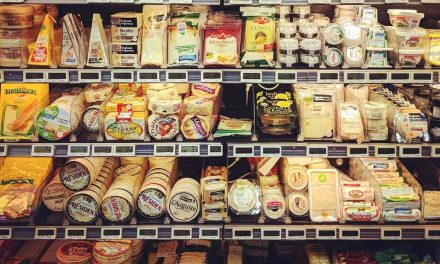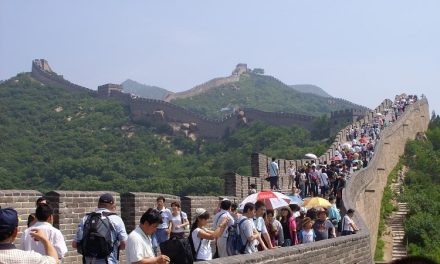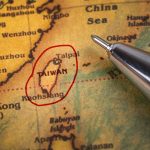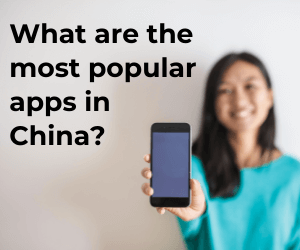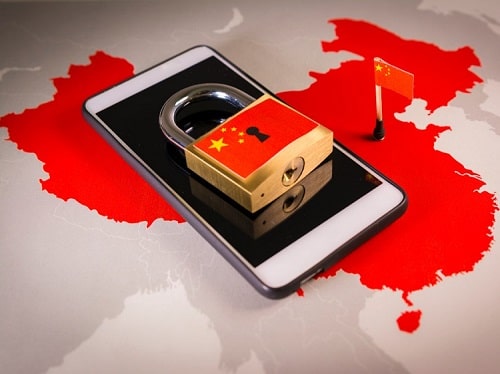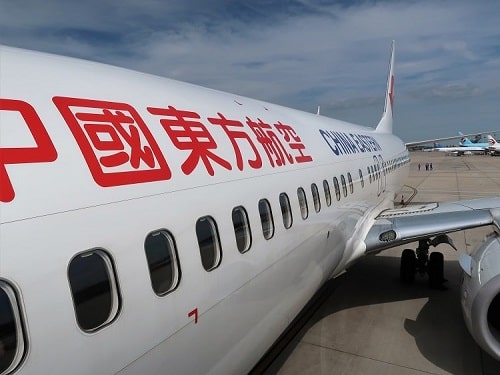Are you about to visit China and wondering what the best souvenirs are?
Well, wonder no more because after years of traveling and living in China, I’m going to share them with you.
From retro propaganda posters to cliché silk clothing, here are the best souvenirs you can buy in China along with some tips and personal anecdotes.
Of all Chinese souvenirs below, the last one is a little tacky but I wanted to include something for everyone!
1. Cloisonné
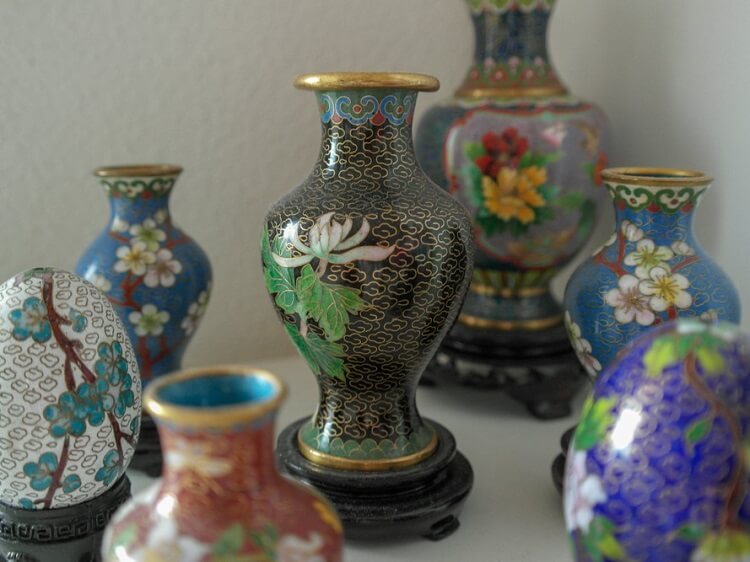
Cloisonné is a unique Chinese souvenir. Image by Noble Nature on Shutterstock.
Cloiso-what?
If you haven’t heard of cloisonné before, you’re not alone. It’s a French word and basically means decorated metal.
Although cloisonné didn’t start in China, the Chinese put their own spin on it by creating unique vases and bowls centuries ago. Nowadays, Chinese cloisonné is the most well-known around the world.
In China, you’ll see cloisonné in lots of touristy places and souvenir shops.
For a simple quality check, hold the item in your hand – it should feel fairly heavy.
If cloisonné isn’t your style, you could opt for some Chinese porcelain instead. But just be careful as it’s fragile and not the kind of thing you can throw in your suitcase.
2. Tea
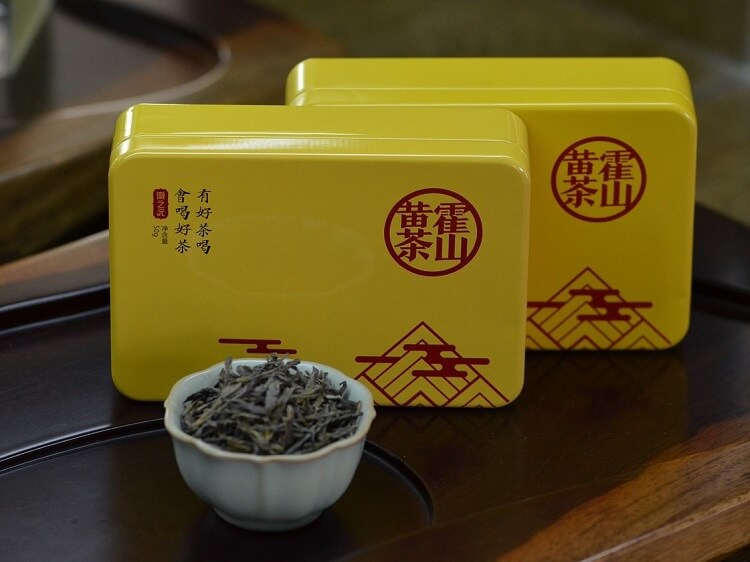
Yellow tea in a nice souvenir tin. Image by Pixabay.
Tea is a great Chinese souvenir. After all, the Chinese invented tea.
Tea is unique, practical, and relatively cheap to buy in China. Different types of tea include:
- Green tea
- Jasmine tea
- Black tea
- Oolong tea.
In China, people drink tea from Chinese teapots, which is why you’ll only find tea leaves for sale there. Chinese people rarely use teabags.
Different regions in China are known for different kinds of tea. For instance, on a recent trip to Shenzhen, I bought some lychee tea.
You might think that sounds sickly sweet, but it was actually quite refreshing and nice to drink all year round.
It can be hard finding tea in China that’s presented in a nice tin or box. I always seem to find lovely presentation packs in the airport stores on the way home, but they’re massively overpriced.
If you have time during your travels in China, pop into a decent sized supermarket and see what you can find.
Tea is much cheaper in supermarkets than tourist shops because it’s priced for the locals.
Just note: countries with strict biosecurity controls (like Australia and New Zealand) require you to declare your tea purchases at the airport on your way home.
But you shouldn’t have a problem if it’s dried, manufactured tea in a sealed pack.
3. Paper cutting
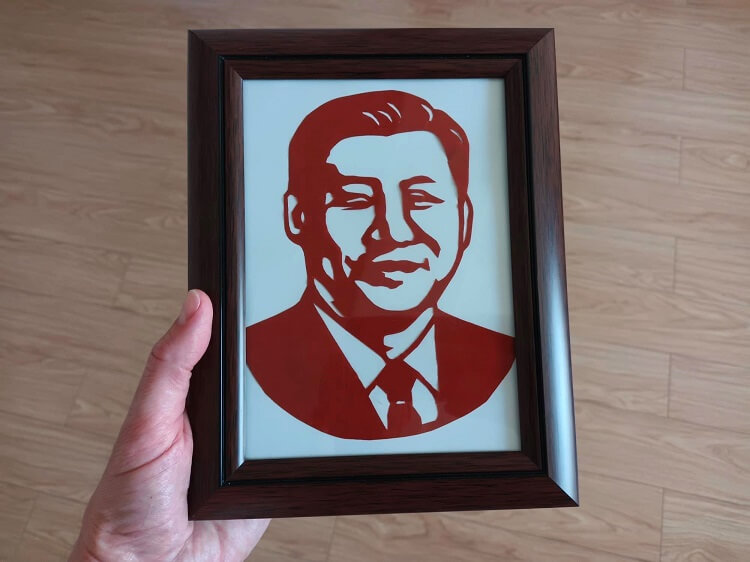
Get your own face framed or choose a famous person. Image supplied by Mike Cairnduff.
At tourist attractions across China, you might see an artisan sitting at a table busily cutting paper.
This is the traditional Chinese folk art known as paper cutting, or jianzhi (剪纸) in Chinese.
It dates back to the sixth century, but people still practice it today.
For under 100 yuan (about US$14), the artist will use their skill to cut out an intricate picture of you, and then frame it.
On a recent trip to Yinchuan, I bought my first Chinese paper cutting and I was pleased with the result. I was given a little bit more hair than I really have!
And on another trip, I picked up a rather interesting framed cutting of Chinese leader Xi Jinping.
It’s a cheeky gift for someone back home who isn’t into politics. Or maybe I’ll decide to keep it – I haven’t decided yet.
4. Silk products
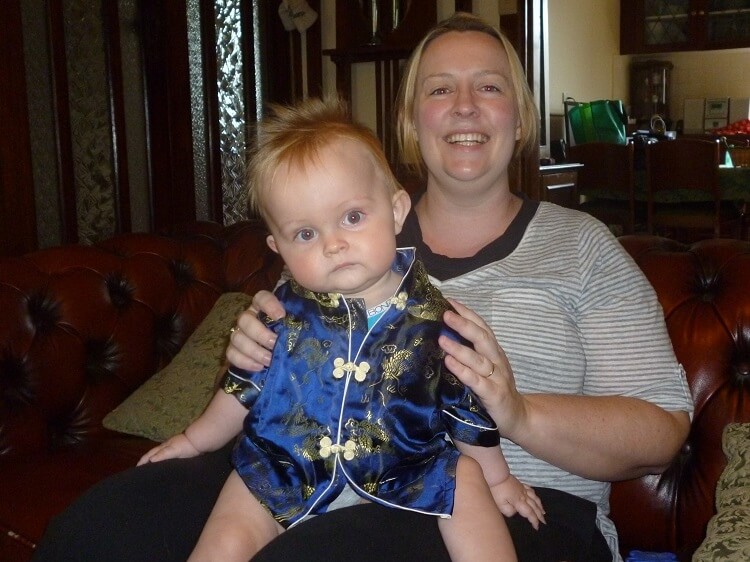
My nephew rocking his Chinese silk pajamas! Image supplied by Mike Cairnduff.
China has been the home of silk clothing since ancient times (ever heard of the Silk Road?).
So, it makes sense that you might want to bring some back with you. Popular silk products include:
- Clothing, such as dresses and scarves
- Sleepwear, such as pajamas
- Bedding, such as sheets and pillowcases.
If you’re traveling in China as part of a packaged tour, you’re bound to be dropped off at a silk factory or silk store on the way to somewhere else like the Great Wall of China.
These places can be a rip-off because everything is priced for cashed-up tourists.
If you don’t have much free time during your tour, however, it might be the only opportunity to buy Chinese silk. So, you’re kind of forced to pay top dollar.
The best tour guides will always take you to legitimate silk stores where the items are good quality. And you’ll find English-speaking staff there.
I remember a few years ago I picked up some really nice silk pajamas for my nephew, who was a toddler at the time. He grew out of them pretty quickly, but boy did they make for some cute photos!
If you’ve got a fat wallet, you could splurge on some lovely silk bed sheets which have numerous health benefits (silk is a natural product).
Otherwise, if you’re on a budget, I recommend buying a silk scarf. These make for perfect gifts because they’re small and light for your suitcase.
See also: Best packing list for China
5. Teapot set
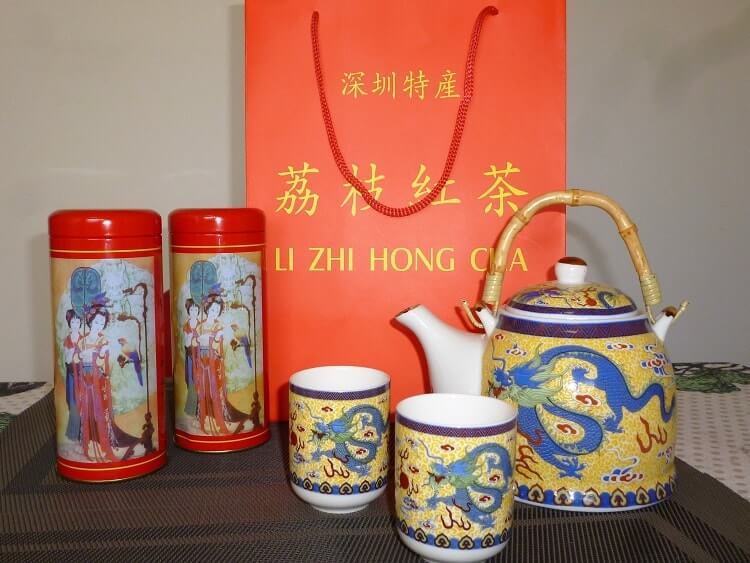
My yellow teapot set from Beijing. Image supplied by Mike Cairnduff.
A teapot set is a nice souvenir you can buy in China, provided you’ve got the space in your suitcase.
The sets vary, ranging from a small teapot and a few teacups through to large sets big enough for your own tea ceremony!
Some tea sets come with a tray that collect any spilled water. You might like this, but when I shopped for a teapot set in China, I wanted something relatively simple without all the bells and whistles.
I still love the set I ended up buying in Beijing. Although it’s uniquely Chinese, it’s quite fresh and modern with its yellow pattern.
Most teapot sets will come in a nice presentation box, with each piece separated so that it doesn’t break when you’re carrying it.
If you buy an expensive set though, I’d take it as carry-on luggage rather than checked-in luggage, in case your suitcase gets thrashed around in the plane.
Remember when buying a tea set, the cups won’t have handles on them. So, you and your guests will need to wait until the hot water has cooled down a bit before you can start drinking.
Also, like most items on this list, try to bargain when you’re buying a tea set in China.
Chinese people will expect you to bargain as it’s part of their shopping culture.
6. Propaganda posters

Propaganda posters make for great souvenirs. Image by Imranahmedsg on Shutterstock.
I absolutely love Chinese propaganda posters. In my opinion, they’re definitely one of the best souvenirs in China.
The retro vibe combined with the symbolic imagery and wording makes them really stand out.
And, Chinese propaganda posters look awesome when they’re professionally framed back home.
One of the best places to buy a poster is at a flea market in one of the big cities. These markets are usually near the tourist areas.
I find it’s easier to spot a reproduction (fake) in person than on online, where you’re just going by what the seller writes in the description.
On a trip to Shanghai once, I bought a poster from the Propaganda Poster Art Centre in the city’s Changning District. If you’re staying near this part of town, I recommend a visit.
Just note that if you buy an original poster, it will probably have imperfections, stains or tears due to its age. But I think that adds character to it!
One of the benefits of this China souvenir is that it’s light and will neatly fit into your suitcase.
7. Snack food

Chinese snack food sure is a conversation starter. Image supplied by Mike Cairnduff.
I always bring back various snack foods from China.
Why? You can get some weird and wonderful flavors that you simply can’t find anywhere else in the world.
I always get a good reaction when giving Chinese snack food as gifts.
Some unusual things I’ve bought over the years include:
- Crayfish flavored chips (addictive)
- Cucumber chewing gum (surprisingly nice)
- Green tea Dove chocolate (an acquired taste).
When I was shopping in Qingdao, I spotted some cola flavored potato chips. I bought a few bags for my family and friends as I knew they would find the image of the dog on the packet a little off-putting, let alone the flavor!
Depending on the person you’re buying for, you could also go a little crazy and buy some distinctly Chinese snack foods.
I always pick up a few vacuum-sealed packs of chicken claws, just to get a scream from friends when I arrive home.
As I’m Australian, I have to declare things like chicken claws when going through the airport. I’ve never had any problems though as they’re processed and not fresh.
8. Mao Zedong memorabilia
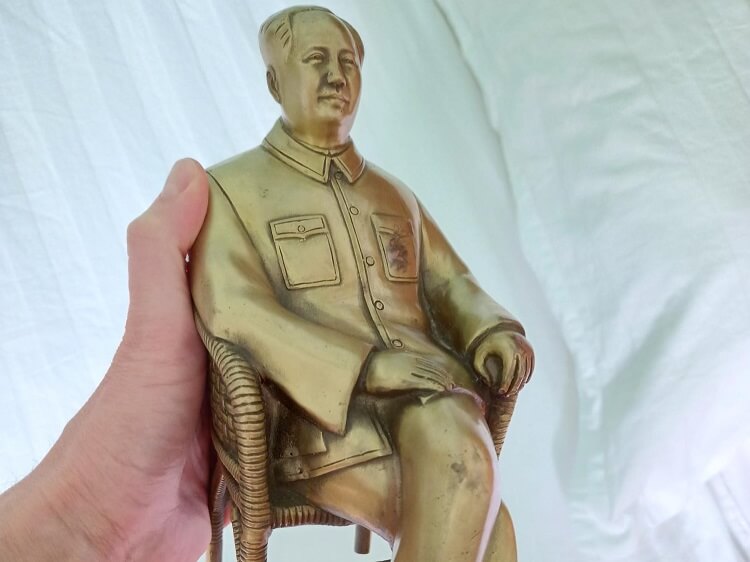
It looks light but it’s actually really heavy! Image supplied by Mike Cairnduff.
You can probably tell by now that I like retro stuff.
On one of my first trips to China, I remember seeing a big brass statue of Mao Zedong at a flea market. It came up to my waist, and I absolutely loved it.
I decided against buying it as I would need to organize shipping to get it home.
I regretted the decision for years, so when I saw a little brass Mao at a Kunming market just a few months ago, I snapped him up very quickly.
The vendor asked 600 yuan (US$80) for it, which I knew was overpriced. So, I offered 200 yuan (US$27), which he agreed to straight away.
I probably should have started even lower!
Nevermind, I still love my little Mao. He’s my new favorite Chinese souvenir.
The best places to find Mao Zedong paraphernalia are in flea markets in big cities or near tourist sites. Otherwise, head to an antique market.
For instance, you could try Panjiayuan or Liulichang if you’re in Beijing.
The most common things include the Little Red Book (I’ve bought an English version), small statues, plates and badges. These are all great little gifts that can fit in your bag.
A word of warning: despite what the vendor says, you’re probably not buying an original, even if you’re at an ‘antique shop’.
In most cases, it’s simply been made to look old.
9. Calligraphy set

A typical Chinese calligraphy set in a souvenir box. Image by Sumalee on Shutterstock.
I’ve bought calligraphy sets in China and I’ve also been given some.
Quality can vary, so make sure you choose a really nice one that you can put out on show. Otherwise, it’s the sort of thing that very quickly gets hidden in a cupboard.
Some vendors selling calligraphy sets will offer to engrave the initials of the person you’re buying for into the stone stamp.
It can be a hefty additional cost and I don’t think it’s worth it unless you’re actually going to use it.
10. Jade

Be careful when buying jade as it may not be the real deal. Image by Anirut Thailand on Shutterstock.
You can find jade everywhere in China.
Be very careful when buying it – it’s probably not real. But you can still find some nice (fake) pieces, including jewelry and vases.
If you want to buy real jade, and are willing to pay the high price, the seller should be able to provide a certificate of authenticity.
Many tour guides are paid commissions for the sales they bring in, so don’t take their word for it.
There are guides on how to tell if jade is real, including a fingernail test to detect real jade from the fake stuff.
All I will say further is ‘buyer beware’.
11. Canvas bags

This gift idea is more contemporary than some of the others. Image supplied by Mike Cairnduff.
OK, stay with me on this one.
I’m a practical kind of person, and I’d prefer my loved ones to use or somehow benefit from what I’m giving them.
Admittedly, good quality canvas bags can be hard to find in China, but all the official gift shops at major Chinese tourist attractions sell them, as well as the big museums.
I’ve picked up some bags with lovely contemporary Asian patterns at the Nanning Museum of Nationalities and the stunning Western Xia Imperial Tombs near Yinchuan.
Expect to pay around 50 yuan (about US$7) for good quality tote bags in museum gift shops.
12. Traditional Chinese medicine

Any idea what these tablets do? Image supplied by Mike Cairnduff.
Here’s one of the most practical souvenirs in China.
Traditional Chinese medicine (TCM) has been around since ancient China began, which is why it’s an important part of Chinese culture.
TCM products can be found everywhere across the country, and they’re cheap.
There are all sorts of things for sale, including:
- Tablets
- Herbs
- Lotions
- Oils.
I remember taking TCM when I caught COVID-19 in China. But it didn’t help, and that’s a whole other story!
Unless you can read Chinese characters, you won’t know what you’re buying. The packaging will be in Mandarin. So, you’ll need to get some help from your tour guide, or use a translation app.
See also: Helpful China travel apps
The last thing you want is giving a loved one some constipation medication which you thought was a headache remedy!
Just don’t go buying hundreds of medications as you may be stopped while going through Customs at your destination airport.
13. Hand painted bottles
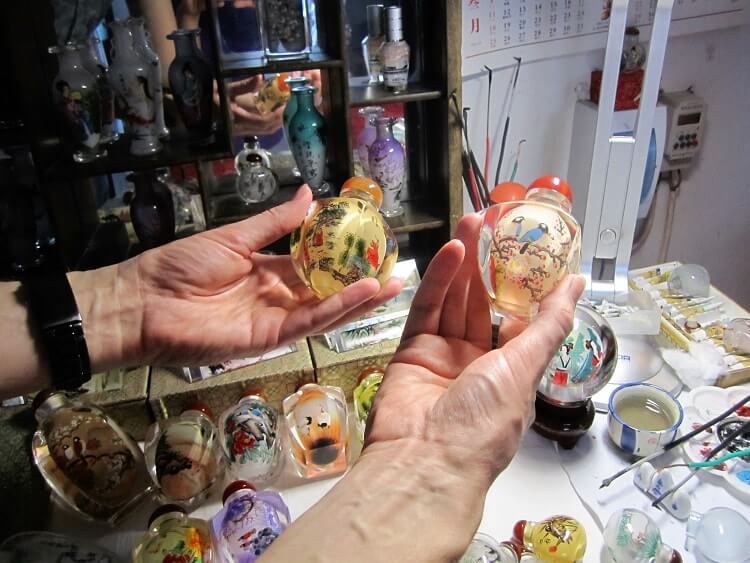
These cute little bottles are really special. Image supplied by Mike Cairnduff.
If you’re not big on cloisonné but still want something to put on show, a Chinese hand painted bottle could be for you.
These tiny glass bottles are either painstakingly painted by hand or mass-produced in factories.
The handmade ones aren’t cheap, but that didn’t stop my friend, Louisa, from buying a few of them on a trip to Beijing a few years ago. We got to meet the artist who actually paints them, too.
From memory, the artisan worked in the Hutongs, the popular area in Beijing with all the ancient alleyways. You can’t get more touristy than that!
When choosing your bottle, there are traditional patterns like flowers, dragons and pandas, but there are also more modern ones too.
14. Terracotta Army statues

The statues come in all kinds of shapes and sizes. Image by Claudio Zaccherini on Shutterstock.
These little beauties are found in – you guessed it – Xi’an, the home of the Terracotta Army.
Like most things in China, the quality of your warrior statues can vary significantly.
You’ll be able to pick up a cheap and dirty box for just a few dollars, or pay top dollar for a carefully crafted set.
I bought one warrior (not a whole set) on a recent visit to the Terracotta Army, where the quality is great even if the high price sucked a little.
Call me strange, but I love knowing my warrior is from the actual site of the Terracotta Army.
When you’re buying, if you want to do a quick quality check, just touch the warrior. If it leaves a black mark on your finger then you know it’s not worth paying much for.
15. Tacky t-shirt

A tourist t-shirt is a cheap and fun way to remember your China trip. Image by Shutterstock.
No trip to any country would be complete without buying a tacky tourist t-shirt.
Inspired by the classic “I heart NY” t-shirt, you can buy “I heart SH” t-shirts at tourist stores in Shanghai, while in Beijing you can find the rather ambiguous “I heart BJ” version.
But you can stroll into practically any Chinese clothing store and find the funniest Chinglish t-shirts, which always make for a good laugh when you get home.
More Chinese souvenir gift ideas
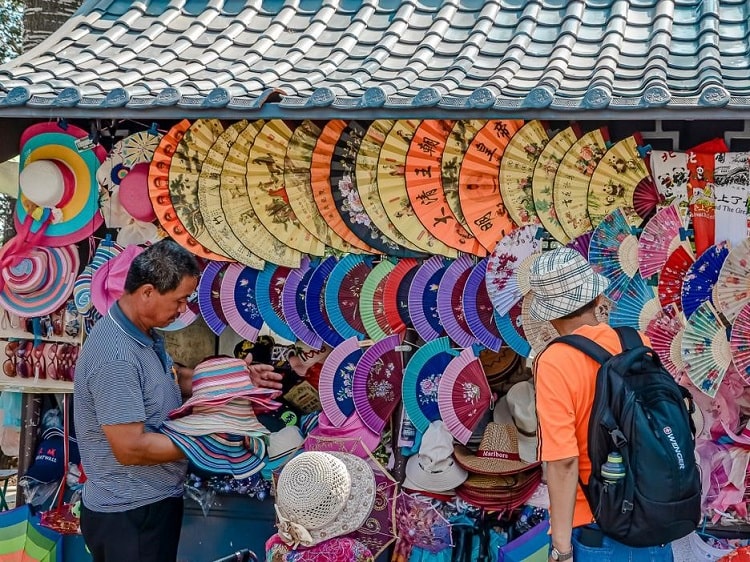
You can buy fans at all the main pedestrian streets in China. Image by LapailrKrapai on Shutterstock.
Need even more inspo?
Then how about these Chinese souvenirs:
- Chinese knots
- Chopsticks
- Fans
- Chinese opera masks (inspired by the Peking Opera)
- Plush panda toy
- Sichuan pepper corn.
These are all fairly small items but are still good souvenirs, and most are suitable for kids (well, except the Sichuan pepper).
Speaking of which, remember to check if any food items would be an issue for Customs when you arrive home. I know it would for me.
Psst! A quick travel tip

Make sure you stay connected in China. Image by Sun_Shine on Shutterstock.
If you want to use Wi-Fi while you’re in China, you won’t be able to survive without a virtual private network (VPN) on your phone.
The Chinese internet is censored, and without a VPN all of your favorite sites and apps (e.g. Instagram, Facebook, YouTube, Gmail, Google, etc) are inaccessible.
Just remember to download the VPN before you arrive as VPN sales are blocked in China.
You can see the best China VPN here or skip my review and go straight here.
Enjoy shopping for souvenirs in China
Shopping is one of the many reasons why people visit China.
From Chinese cloisonné, silk and tea to the more obscure propaganda posters, there’s something for everyone.
Let me know in the comments what your favorite one is, or if I’ve forgotten any.
Have a great time shopping for souvenirs in China!
Thanks for reading my blog. I’ve also written an article about tipping in China which you’ll find really helpful. Hint: you don’t need to tip in China but there are exceptions.
FAQ about souvenirs in China
What is the most popular souvenir in China?
It depends on your preferences, but most tourists love Chinese tea, silk and jade.
What souvenirs can you get from China?
You can get traditional things (e.g. tea sets, paper cuttings, silk products), practical things (e.g. tea, clothes, snack food), unique souvenirs (e.g. Mao Zedong memorabilia) as well as more expensive items (e.g. cloisonné and jade).
Where can you find souvenirs in China?
Try busy shopping streets and local markets near popular tourist attractions. Traditional Chinese souvenirs can be found in and around all the major tourist sites. Shopping malls usually don’t sell souvenirs.
What’s cheap to buy in China?
The cheapest souvenirs include fake jade jewelry, snack food, little Mao Zedong era items like badges, and tea bought from supermarkets (not tea shops).



